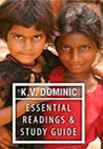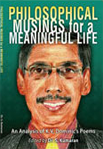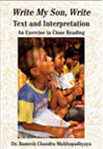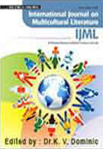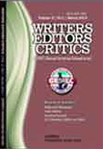Books Review in Detail
Review Of Aju Arvind’s Review of K. V. Dominic’s Winged Reason
Aju Arvind’s Review Of Winged Reason
K.V. Dominic. Winged Reason. New Delhi: Authorspress, 2010.
pp. 77. Price Rs. 95/-. ISBN 978-81-7273-530-2
Dr. Aju Aravind
           Dominic, a late bloomer in the world of Indian poetry, exhibits his penchant for social themes such as religious harmony, poverty, dowry, corruption, old age problems, terrorism, alcoholism, kidnapping, and the “dreadful … life in Tsunami camps†in his maiden book of verse Winged Reason. The collection of thirty nine poems, including half-a-dozen ‘elegies’ or death-related poems, begins with ‘In Memoriam: George Joson.’ The death of his colleague (George Joson) provokes the poetic muse in him to articulate his philosophic attitude and social consciousness.   Dominic mourns the death of E. K. Nayanar, the Communist Chief Minister of Kerala; Kaumudi Teacher; and Michael Jackson in this collection. We find reference to the theme of death and solitude in his poems like ‘A Blissful Voyage,’ ‘Ammini’s Lament,’ and ‘Ammini’s Death.’
           His use of conversational style to subtly expose social evils such as dowry, alcoholism, mafia, unemployment, old age problems and other socio-cultural issues that rocks contemporary society makes the reading of his poems a memorable and enlightening experience for all sections of the society.  For instance, in his poems ‘What a Birth’ and ‘Rahul’s World’ he talks about the plight of the women and children who are destined to suffer at the hands “Drunkard husband†who “will come at night / to resume beats and kicks†(58).  In ‘Rahul’s World,’ Dominic echoes the plight of Rahul who:
                                       Couldn’t study
                                       yesterday’s portion
                                       . . . . . . . . . . . . . . . .
                                       Drunken father
                                       beat mother
                                       beat Rahul,
                                       Kicked away supper
                                       none could sleep. (55)
Through Rahul, Dominic speaks the plight of many families haunted by the specter of alcoholism.  Ironically Kerala is one of the largest consumers of alcohol in the country, where “long queue… / Like a line of ants before their hole†wait for their turn in front of the “liquor shop run by the government†and “poor women wait for their ration†(22) is a common sight.
The poet voices his concern about the widening gulf between the rich and the poor in his poems like ‘A Nightmare’ and ‘Haves and Have-nots,’ sarcastically calling into question “socialism and communism† (37) the hallmark of democracy in Kerala. He also refers to social issues like corruption and nepotism and compares the state of Indian democracy where:
Secularism butchered;
caste and religion
raise their hood;
regionalism and parochialism
devour
nationalism and patriotism. (60)
and the “dreadful … life in Tsunami camps,†who helplessly cry:
“It’s better to kill us than torture like this.â€
“We don’t have sufficient food,
we don’t have pure water.†(33)
with
the golden rule of Maveli
an Icon of the just king. (54)
Here it would not be out of context to mention that the Kerala government had been criticized for not being able to rehabilitate the tsunami victims. Dominic refers to the mythological figure of Maveli, who once ruled over Kerala in his poem ‘Onam.’ During his reign there was “no lies, no crimes, no deceit, / and no cheat; / no poverty, no child death†(54).
He puts forth social issues like unemployment and dowry, rampant in the society. In his poem, “Cry of My Child,†he voices the anguish of a “Graduate and unemployed†mother who “wrote test after test†and “has to feed seven members; / his aged parents / and his young sisters.†(73). He sympathises with a woman who is torn between frustration/duty and affection and is unable to feed her crying child until she “complete(s) the exam†(73). Dominic unveils serious social issues like female foeticide and atrocities against women in poems like ‘Laxmi’s Plea’ and ‘International Women’s Day.’
The sensitiveness and compassion of Dominic is manifested in his poem ‘A Blissful Voyage’ when he expresses his pain for the people killed in the Iraq war. He expresses his desire to “shake hands with Obama / and thank my American sisters and brothers†(21). This alludes to the vital role that the Gulf and the West plays in the day to day life of the Keralities. It does not however mean that Dominic is not concerned with sensitivity and emotion of the ordinary people.
He describes the pathos and ironies of modern cyber age civilisation and laments the loss of tradition and culture in ‘Gayatri’s Solitude’ and ‘Old Age.’  He expresses his anguish for the old “… mother of five children: / three sons and two daughters; / all in the States†(31) in the poem ‘Gayatri’s Solitude,’ a victim of Empty Nest Syndrome which is hunting Keralities, and tries to point fingers at the damage done by “… old-age home / modern with AC†(31).
In the collection Dominic speaks against man’s unequal treatment towards his fellowmen, in poems like ‘Haves and Have-nots,’ and raises his anguish at the wanton felling of trees in ‘I’m Just a Mango Tree.’ He has attempted to show how evils and sins are done by man in the name of God, and pens philosophical themes in poems like ‘Solar Eclipse’ and ‘Om.’ He also writes about the crimes like kidnapping and echoes his compassion for suffering children in poems like ‘Aanand’s Lot,’  ‘A Nightmare,’ ‘Vrinda,’ and ‘Helen and her World.’ His poem ‘Lal Salaam to Labour’ is ironical. It is interesting to note that his collection ends with a poetic tribute to ‘Michael Jackson, King of Kings.â€
Dominic’s poems are political and subtly expose the real picture of Kerala. But he neither attempts to criticise nor tries to give any conclusions. Instead, he presents the pros and cons of the issue and leaves it to the reader to decide and respond. The volume attempts to draw a caricature of contemporary Kerala in verse.
On the negative side, some of his poetry reads like prose broken into lines of various lengths while some images and contexts are unnecessarily explained, as seen in the poem ‘Onam.’ Though the preface to the collection appears to have little bearing upon the poems, he is readable and his maiden book  should  help him carve a respectable place among Indian English writers today.
Dr. Aju Aravind (English Critic) Jharkhand, India.
Dr. Aju Aravind, Assistant Professor of English, Dept. of Humanities and Social Sciences, Indian School of Mines, Dhanbad-826004, Jharkhand, India.

